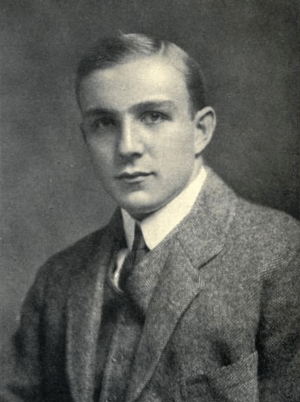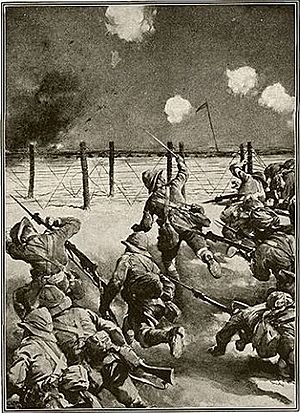Robert Palmer (British writer) facts for kids
Quick facts for kids
Robert Palmer
|
|
|---|---|

Palmer in 1911
|
|
| Born | 26 September 1888 London, England |
| Died | 21 January 1916 (aged 27) Hanna defile, Ottoman Empire |
| Service/ |
British Army |
| Years of service | 1913–1916 |
| Rank | Captain |
| Unit | Hampshire Regiment |
| Battles/wars | |
| Memorials | Basra Memorial, altarpiece at Winchester College |
| Alma mater | University College, Oxford |
Robert Stafford Arthur Palmer (born September 26, 1888, died January 21, 1916) was a British soldier, lawyer, and poet. He came from an important family. His grandfather was a former Prime Minister of the United Kingdom.
Robert went to Winchester College and University College, Oxford. He was very interested in law and the Church of England from a young age. At Oxford, he led the university's Church Union and the main debating society. He also helped people in need by volunteering at a Church of England center.
After college, Robert traveled to India and wrote a book about it. He then worked at a school that helped poor children. He decided to become a lawyer and started his legal career in 1913.
His work as a lawyer was cut short by the First World War. He joined the army in 1913 and was called to serve when the war began. He became a captain and was sent to India, then to Mesopotamia (modern-day Iraq). He was sadly killed in battle in 1916. A poem he wrote was published shortly before he died.
Contents
Robert's Early Life
Robert Palmer was born on September 26, 1888, in London. His grandfather, Robert Gascoyne-Cecil, 3rd Marquess of Salisbury, was the Prime Minister at the time. Robert's father, William Palmer, 2nd Earl of Selborne, was also a well-known politician.
Friends and family called Robert "Bobby." He was named after his grandfather and two important politicians. He was also a cousin to Edward Grey, who later became a famous Foreign Secretary.
Robert's Childhood and School
From the age of six, Robert wanted to be a lawyer. He also loved nature, collecting butterflies and birds' eggs. When he was eight, he went to Colet Court, a school in London. He became the head boy there.
In 1901, he became a confirmed member of the Church of England. He had a strong religious faith throughout his life. In 1902, he was a page to the queen at the coronation of King Edward VII.
In September 1902, Robert started at Winchester College, a famous school in Hampshire. In 1905 and 1907, he visited his family in Southern Africa. His father was working there as a high commissioner. Robert did very well at Winchester. He became a senior student leader and stopped most physical punishments. He won awards for English, history, and Greek. He even wrote an article about "The Labour Problem in South Africa" that was published in a magazine in 1906.
He won a scholarship to University College, Oxford, as the top student out of 157 applicants.
University Studies
At Oxford, Robert studied classical moderations and literae humaniores, which are studies of ancient Greek and Roman culture. He continued his strong interest in Christianity. He became good friends with Nathaniel Micklem, who later became a famous religious scholar.
Robert volunteered at Oxford House in East London. This was a Church of England center that helped poor people. He gave free legal advice to those who needed it. He also helped with a missionary campaign in South London in 1908. From June 1909, he was the president of the Oxford University Church Union. In this role, he helped create a new service book for the university.
Debating and Politics
Robert also joined the Oxford Union, a famous debating society. His first speech there was against the government's plans to change the House of Lords. He was elected secretary of the Union in November 1908. He later became president in November 1909.
While at Oxford, Robert started writing a novel, but he never finished it. He supported the Liberal Unionist Party in politics. He helped campaign for them in the 1910 general election. He graduated from Oxford with top honors in 1911.
Becoming a Lawyer
In 1911, Robert traveled to India. When he returned, he wrote a book about his trip called A Little Tour in India. He then worked at Oxford House as a resident helper. In 1912, he became a governor at Edghill House in Sydenham. This school provided education to children from poor families.
He was offered a job as a dean at New College, Oxford, but he turned it down. He wanted to focus on his dream of becoming a lawyer.
In November 1913, Robert officially became a lawyer, or "called to the bar" at the Inner Temple. He trained with a lawyer named Howard Wright. He worked in the same law offices that his grandfather, who was a lord chancellor, had used. From June 1914, Robert worked on the Western Circuit, which meant he traveled to different courts. On July 14, 1914, he handled his first case in Winchester.
Serving in the First World War
Robert joined the 6th Battalion of the Hampshire Regiment on February 6, 1913. This was a part-time army unit called the Territorial Force. He was a second lieutenant at first. In July 1914, his unit was doing its annual training when the First World War began. They were quickly called up for full-time service.
Robert was promoted to lieutenant on September 2, 1914. His unit was sent to Dinapur, India, in October 1914. He later became a temporary captain on April 2, 1915.
In August 1915, Robert was sent to Mesopotamia (modern-day Iraq). He was in charge of a group of men joining his regiment's 4th Battalion. This battalion was fighting in the Mesopotamian campaign. One of Robert's poems, How Long, O Lord, was published in The Times newspaper in October 1915.
On November 24, while in Amarah, Robert hurt his leg playing football. He wanted to join his unit as they marched towards Baghdad. However, his injury meant he had to stay in the hospital for five weeks. During this time, he gave lectures, including one about Germany's rise as a world power.
The Siege of Kut
The British army's advance had stalled, and their troops were trapped in a town called Kut. Robert joined a group sent to try and rescue them. He left Amarah with this force on December 31, 1915.
Robert fought in the Battle of Sheikh Sa'ad (January 6–8) and the Battle of Wadi (January 13). These battles happened as his unit marched towards Kut.
At the Battle of Hanna on January 21, Robert was second-in-command of his company. His unit was attacking a Turkish trench line. They came under heavy fire. Robert was wounded in the leg but kept moving forward. He was hit again while trying to encourage his men to fight back.
Out of 310 men in his battalion, only 51 were not wounded in the battle. Robert was reported missing, and it was thought he had been captured. His parents learned he was missing in February. Later, in March, it was confirmed he had died as a prisoner of war. A soldier named A. P. Herbert wrote to Robert's parents in May 1916. He explained that Robert had been badly wounded in the chest. He died four hours after arriving at the prisoner-of-war hospital.
Robert is remembered on the Basra Memorial in Iraq. This memorial honors soldiers who died in the Mesopotamian campaign but whose graves are unknown. He is also remembered by a special altarpiece at Winchester College. His letters from Mesopotamia and some of his poems were published in a book called Letters from Mesopotamia in 1916.
Robert's Poem: How Long, O Lord
This poem was written by Robert in Mesopotamia in 1915. It was even shown in a TV series called The Great War. Here is the poem:
How long O Lord, how long, before the flood
Of crimson-welling carnage shall abate?
From sodden plains in West and East the blood
Of kindly men streams up in mists of hate,
Polluting Thy clean air: and nations great
In reputation of the arts that bind
The world with hopes of Heaven, sink to the state
Of brute barbarianism whose ferocious mind
Gloats o’er the bloody havoc of their kind,
Not knowing love or mercy. Lord, how long
Shall Satan in high places lead the blind
To battle for the passions of the strong?
Oh, touch Thy children’s hearts, that they may know
Hate their most hateful, pride their deadliest foe.


